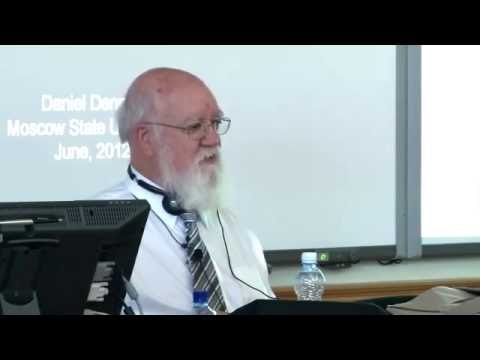Philosophy Overdose
Dan Dennett gives another talk on consciousness and the mind. This was given at Moscow State University in June 2012 as part of the Moscow Center for Consciousness. Credit to them for this video. For more information, go to http://hardproblem.ru.
Source
Hume’s Strange Inversion of Reasoning (Daniel Dennett)




boring prick
"they mistake effects for causes" he says. But Hume tried to show there was no such thing as causes. So there is no way to mistake something one might call and 'effect' with something that doesn't exist.
Very confusing.
This comment section is about as angry and depressing as any other youtube comment section. Calm down and argue your points in a detached philosophical way.
Isn't the software/hardware explanation just an argument from analogy?
"boring prick"
– A well argued YouTube review
SPOUTING NONSENSE
This is about the nature of cause and effect i.e., c is a true cause of e iff the mind perceives a necessary connection between c and e. Of course it won't by definition. We have to distinguish between logical and causal causes, of course.
Daniel wants to argue for only accidental causes, that there are no necessary causes, because he doesn't want to introduce the will of an infinitely perfect being and it's effects.
Similarly, he will argue against continuity, because he doesn't want the ‘conservation is but continuous creation’ argument. Little does he realise that this undermines his pet love, the Theory of Evolution. I hope people can see the logical contradiction of change over time if there's no continuity held in the mind. Evolution entails changes in heritable physical or behavioral traits. Daniel will invoke Hume's psychological continuity of the mind, no doubt, to override logic and the lack of cause and effect.
Very good! ??
All of a sudden, I'm experiencing a powerful yen for a Red Stripe Jamaican Lager.
Atheists talk about God far too much?
When you detect glucose in a substance be sure that it tastes sweet to most of the people. Feeling of sweetness arises as the result of interaction between humans and e.g. honey.
By the way if the colour of the stripes on the picture were yellow would you perceive red colour afterwards? The answer is NO.
¡
“By downloading virtual machines…” – is Dennet a Deleuzian now?
Termites may have a residual shared consciousness. This may explain why orders and blueprints are redundant. No conscious being has the right to deny the sentience of another as no matter how many times you dissect a brain you will never find consciousness. It is subjective and definitive of life. A communal sentience, hive mentality, doesn't negate the ability of the individual to have conscious awareness.
There seems to be a minor flaw in Dennetts initial flag premise here (but opticians may correct me if I'm wrong). When the eye observes the color red, what it actually does is absorb photons of a given wavelength and processing that. So when you see something of other wavelengths and stare at them for a while, those wavelengths are burnt onto the retina and take a while to go away. So when the color white then strike the retina, It makes perfectly intuitive sense that a "wavelength blending" should occur and thus produce the color red as a result, because that's the information that your neurons are getting from the retina. Also, in math two things can be identical in effect/result, but not in origin. e.g. "2+3" and "4+1" are identical in sum, but different in structure.
22:43 "Here's what you actually experience: A and then B, A and then B…[But you don't have any experience of causation.] This [conjunction of A and B] CAUSES you to see A causing B…"
Hmmm…
Does Dan Dennett regularly meditate? Because what he's often seems to get at is amazingly in accordance with certain aspects of Buddhist philosophy that arose from deep practice of meditation.
On Science, Religion, Evolution. A Catholic Perspective
“Ordinary speech primarily and properly describes what comes under the senses; and somewhat in the same way the sacred writers—as the Angelic Doctor also reminds us—‘went by what sensibly appeared.’”
Pope Leo XIII, Providentissimus Deus
It is indubitably true and was obvious even to the ancients that God, seeking to relate all that is necessary for truth, wisdom, and the way of salvation, employed universal ordinary and poetic language, according to "what sensibly appeared," including anthropmorphisms, simile and metaphor. No Christian at any time in Church history could with the Church's approval contradict common sense / reason by confusing poetic metaphorical language for an absurd literalist misinterpretation.(1)
Nevertheless what any metaphor or anthropmorphism is intended to teach is likewise obvious to biblical reason ("I am the Vine, you are the branches" Jn. 15: Vine / branches = Mystical Body of Christ) and is essential for both Truth and salvation.
Even post-Enlightenment man uses such devices to speak in ordinary or anthropomorphic language as when we speak of "the four corners of the earth;" and even scientists can be heard declaring things like "Nature guides us in her path because…," etc. and such like phrases in ordinary or even teleological language.
All of this regarding metaphor and poetics will never contradict the facts of the created cosmos which it has not always pleased God to reveal. Scripture teaches what can be known truly (i.e., what it has pleased God to reveal demonstrably), though never exhaustively.
As Nathan Bossoh writes somewhere, St. Thomas Aquinas' "understanding was that religion (religio) was a moral virtue related to justice. When we turn to Aquinas’ understanding of science (Scientia) we find similar discord with our modern notion. For Aquinas science was a habit of the mind, or an “intellectual virtue” acquired through the rehearsal of logical demonstration (rather than an outward accumulation of knowledge built up by a community of scientists over the decades as we see it today). Cf. Harrison, The Territories of Science and Religion. Chicago: UCP. p7, pp11-12"
The trouble today, we know, involves the difference between science (what can certainly be proved beyond doubt about the material cosmos) and scientism (speculative science, epistemological models of interpretation which may or may not be true or helpful).
So we have the difference between what can be called Hard Science (practical science that can be demonstrated to be true and helpful, e.g., in chemistry, biology, mathematics, medicine, etc.) and Scientism which too often busies itself with speculative / theoretical or epistemologically dubious approaches to the the study of the material cosmos which cannot be proven in any final sense.
Scientism also often involves hidden metaphysical assumptions or presuppositions which are dubious or false and which can and should be exposed. It often confuses its own metaphors and anthropmorphisms with facts (sometimes, as stated, consciously or unconsciously speaking of "nature" as teleologically guided by a hidden hand or force we can allegedly trust) as when it substitutes metaphorical concepts like "evolution" (philosophical becoming as opposed to Being) for a genuine demonstration of how such theories can be demonstrated, often crossing over into metaphysical assumptions or theories by assuming it can even assert WHY such a theory or model of interpretation is, for that school, likely.
Darwinism is another cherished cultural scientistic dogma which is today confused with real Science, though it can never be more than a model of interpretation, an interpretive model or way of seeing, a theory and, today, a veritable conceptual revolution; and in this instance a particularly pernicious one since it is totalistic and seeks to interpret ALL data (cosmological, anthropological, even sociological) through its theoretical lenses.
Cf. philosophers of science like Karl Popper, Paul Feyerabend, et al for more on this. Science today is more than ever a philosophically-loaded concept.)
Darwinian evolution is clearly philosophy, not demonstrable and falsifiable science, like, say, chemistry is.
Darwin's grandfather, Erasmus Darwin, bequeathed this esoteric alternative to Creation to his grandson. It was a family narrative stretching in various forms all the way back to Anaximander, Heraclitus and beyond.
Darwin never intended to see anything but "evidence" for the family philosophy when he went out to the Galapagos. He came back in a short time with no proof at all but a myth, a meta theory he called "natural selection" as the alleged mechanism of it all.
Thomas Huxley (known as Darwin's bulldog) got to work in the Lodges and schools to propagate the new counter theory. And in a few years every discipline on earth from the cosmological to the, yes, sociological "sciences" were interpreted through this new magic lens or way of seeing in the name of "Science". And because it is an unfalsifiable counter-faith, its adepts have never for a moment doubted what they could never understand or explain. They simply transferred the attributes of God to this amorphous "science" magik.
"Science" then is one of the most philosophically loaded, equivocal concepts in language today as it was for Francis Bacon, but far more so today.
Chesterton said there are two kinds of people: those who accept dogmas and know it, and those who accept dogmas but don't know it.
Evolution is a powerful totalistic myth imposed like a religion, interpreting all the data in the universe that IS (exists), and is conveniently unfalsifiable.
So in the final analysis there has never been a real conflict between religion and Science. Any conflict that exists is between what are genuine facts and what are only speculative or metaphysical theories (hidden or not) posing as facts. — Stephen Hand
N.B. Genesis 1-3 by God's providence employs facts in images which teach the truths about the Fall into Original Sin and the path of Redemption in a way that combines the literal and the symbolic in a non-contradictory, even if challenging way. That Our Lord and St. Paul refer to the literal Adam, the Fall into Original Sin and consequent spiritual and physical suffering and death confirms the truth of what is revealed and can be known as certain.
________
(1) Thus, in Genesis God moves ( 1:2 ), divides ( 1:4 ), places ( 1:17 ), blesses (1:22), plants ( 2:8 ), walks ( 3:8 ), shuts ( 7:16 ), smells ( 8:21 ), descends ( 11:5 ), scatters ( 11:8 ), hears ( 21:17 ), tests ( 22:1 ), and judges ( 30:6 ). — Baker's Scripture Study
Is A Personal God Improbable? Or Is it We Who Are Improbable?
Atheism has traditionally scoffed at the thiestic belief in a God who is Personal or SupraPersonal. I've always found their position to be a counterintuitive curiosity. One of the reasons why is that I find myself, a personal being, to exist. I am here. You are here. And this existence never ceases to be a shock when I consider the statistical improbability of any of us (or any thing) existing at all.
I, a personal being who has no reason in myself for existing at all, can look into the eyes of other people, other personal beings who also inexplicably exist. I can deeply commune with people I love… How can that not be seriously and forever astonishing, a shock to awakened persons, unless the routines of cultural existence and a devil's advocate style "education" have talked us out of it, dulled us into forgetfulness of that primal metaphysical shock?
But if I am personal and find myself mysteriously here, why should our expectations for a statistically improbable universe not find its Origins in the profoundly Personal?
Of course one may simply prefer that it not be so, a priori. But such a prejudice hardly makes such a preference compelling.
That the universe is Personal because Our Maker is Personal is hardly as counterintuitive as atheism. It is, rather the default presupposition of those in the human race who have not been talked out of it by clever logical somersaults and strangely constructed alternatives.
The Big Bang Cosmological Model for the Universe Is Logically Also A Problem for Scientists.
To make a long story short, theistic thinkers have long observed that an expanding universe must have a Singularity or Cause [The initial singularity being a singularity of infinite density thought to have contained all of the mass and space-time of the Universe which exploded into being from— what? Nothing at all?]
It is counterintuitive to believe that everything that is came from nothing at all. Children and very great scholars have long understood this, and for good reason.
Theistic thinkers note…
The universe must have a beginning, else it could not expand. Thus the expanding universe is a contingent effect of that inexplicable Singularity.
The cause of the effect, then, must transcend the effect (else it could not be the Cause).
Since the effect is subject to time and space and physicality, the Cause must be timeless (not subject to change) and immaterial (not contingent physicality) else it would be no cause.
There can be no infinite regress of causes, per Occams Razor.
So here we are… Gen. 1:1: "In the Beginning God created the Heavens and the earth…So God created mankind in his own image, in the image of God he created them" (vs.27)
This has hardly been surprising to millions down through the ages and up to this very minute. This explains everything, or at least exponentially more than the alternative faith of atheism ever can. Created intellects cannot of course understand this "everything". Our heads are only a little larger than coconuts. But we now understand enough.
And if Our Maker is Personal why should it surprise anyone that He would …communicate… with us, his created gifts, the works of His own hands? Gen. 1:1, Exo.3:14; Jn. 8:58… And that all the moral choices He asks us to make add up to something final, for good or ill?
The Precondition of Doubt
I was telling a friend recently I am somewhat amused and perplexed, with every child, by those who pose the existence of the Creator as an intellectual problem when God is the pre-'condition' of every thought, even every doubt (Exo.3:14, Jn. 8:58), though some will not believe even if they see a man raised from the dead. In such an event they would, rather, reach for their measuring devices and accuse us of circular reasoning.
However I (a man advancing fast towards old age, yes even towards sister death herself, and weary of debates) am unceasingly amazed at the phenomenon that any of us *are*, and are able to reason at all, a 'thing' skeptics seem to take for granted as though being and reasoning were a ho-hum datum of every day life. Which it is. And isn't …not by a long shot. That we exist and can reason should come as a shock to any normal man.
I remember as a very small child staring at the bluest sky, the resplendent sun and gigantic white fluffy clouds, lost in the wonder of it all. All these years and decades later it still overwhelms me when I'm out walking. It is the unceasing shock of being. And if I am wondrouly personal, if we all are, then that our Cause should be so first is hardly a shock but a marvel of communion.
Atheism, alas, has literally nothing to offer. Nothing. Nothingness. The nihil. — Stephen Hand
Socrates Meets Hume by Peter Kreeft
https://www.amazon.com/dp/B003Z9JMRA/ref=cm_sw_r_other_apa_ui0UBbT8YXEP1
It's not just theism that Hume makes war against but Causation / Induction (thus destroying science itself), Time, Location, Personal Identity (which can really amount to only mere sensations he said)…and so on. David Hume was a playful, clever, mischievous polemicist who indulged sheer reductionism his entire life. And I'm sure he could even "prove" he himself did not exist, as all good skeptics can
Why listen to Dennett until he absolutely proves that HE exists independent of your senses?
Dennett's constant analogy between human beings and computers, without consideration of the profound, qualitative differences, shows how his methodology is question-begging from first to last. "A little error in the beginning becomes a great error in the end," Aquinas said.
Is A Personal God Improbable? Or Is it We Who Are Improbable?
Atheism has traditionally scoffed at the thiestic belief in a God who is Personal or SupraPersonal. I've always found their position to be a counterintuitive curiosity. One of the reasons why is that I find myself, a personal being, to exist. I am here. You are here. And this existence never ceases to be a shock when I consider the statistical improbability of any of us (or any thing) existing at all.
I, a personal being who has no reason in myself for existing at all, can look into the eyes of other people, other personal beings who also inexplicably exist. I can deeply commune with people I love… How can that not be seriously and forever astonishing, a shock to awakened persons, unless the routines of cultural existence and a devil's advocate style "education" have talked us out of it, dulled us into forgetfulness of that primal metaphysical shock?
But if I am personal and find myself mysteriously here, why should our expectations for a statistically improbable universe not find its Origins in the profoundly Personal?
Of course one may simply prefer that it not be so, a priori. But such a prejudice hardly makes such a preference compelling.
That the universe is Personal because Our Maker is Personal is hardly as counterintuitive as atheism. It is, rather the default presupposition of those in the human race who have not been talked out of it by clever logical somersaults and strangely constructed alternatives.
The Big Bang Cosmological Model for the Universe Is Logically Also A Problem for Scientists.
To make a long story short, theistic thinkers have long observed that an expanding universe must have a Singularity or Cause [The initial singularity being a singularity of infinite density thought to have contained all of the mass and space-time of the Universe which exploded into being from— what? Nothing at all?]
It is counterintuitive to believe that everything that is came from nothing at all. Children and very great scholars have long understood this, and for good reason.
Theistic thinkers note…
The universe must have a beginning, else it could not expand. Thus the expanding universe is a contingent effect of that inexplicable Singularity.
The cause of the effect, then, must transcend the effect (else it could not be the Cause).
Since the effect is subject to time and space and physicality, the Cause must be timeless (not subject to change) and immaterial (not contingent physicality) else it would be no cause.
There can be no infinite regress of causes, per Occams Razor.
So here we are… Gen. 1:1: "In the Beginning God created the Heavens and the earth…So God created mankind in his own image, in the image of God he created them" (vs.27)
This has hardly been surprising to millions down through the ages and up to this very minute. This explains everything, or at least exponentially more than the alternative faith of atheism ever can. Created intellects cannot of course understand this "everything". Our heads are only a little larger than coconuts. But we now understand enough.
And if Our Maker is Personal why should it surprise anyone that He would …communicate… with us, his created gifts, the works of His own hands? Gen. 1:1, Exo.3:14; Jn. 8:58… And that all the moral choices He asks us to make add up to something final, for good or ill?
The Precondition of Doubt
I was telling a friend recently I am somewhat amused and perplexed, with every child, by those who pose the existence of the Creator as an intellectual problem when God is the pre-'condition' of every thought, even every doubt (Exo.3:14, Jn. 8:58), though some will not believe even if they see a man raised from the dead. In such an event they would, rather, reach for their measuring devices and accuse us of circular reasoning.
However I (a man advancing fast towards old age, yes even towards sister death herself, and weary of debates) am unceasingly amazed at the phenomenon that any of us *are*, and are able to reason at all, a 'thing' skeptics seem to take for granted as though being and reasoning were a ho-hum datum of every day life. Which it is. And isn't …not by a long shot. That we exist and can reason should come as a shock to any normal man.
I remember as a very small child staring at the bluest sky, the resplendent sun and gigantic white fluffy clouds, lost in the wonder of it all. All these years and decades later it still overwhelms me when I'm out walking. It is the unceasing shock of being. And if I am wondrouly personal, if we all are, then that our Cause should be so first is hardly a shock but a marvel of communion.
Atheism, alas, has literally nothing to offer. Nothing. No Thing. Nothingness. Nowhere. The Nihil. — Stephen Hand
I cannot listen to yet another word from Dennett until he stops biologically evolving and his ideas are finally stable, at stasis. As is, he is in constant process from one thing to Who Knows What, total becoming, total flux, unripe, incomplete, in part…Please put a plastic bag over his head until he is done flowing…
Theistic thinkers note…
The universe must have a beginning, else it could not expand. Thus the expanding universe is a contingent effect of that inexplicable Singularity.
The cause of the effect, then, must transcend the effect (else it could not be the Cause).
Since the effect is subject to time and space and physicality, the Cause must be timeless (not subject to change) and immaterial (not contingent physicality) else it would be no cause.
There can be no infinite regress of causes, per Occams Razor.
So here we are… Gen. 1:1: "In the Beginning God created the Heavens and the earth…"
Daniel, take a walk in the park every now and then buddy. Your arteries might be harder than refuting Hume’s impressions
You are a moron Dennett.
Human brains are not like termite colonies you fool.
If the mind and brain are the same thing and free will is only an illusion, then where to we house illusions?